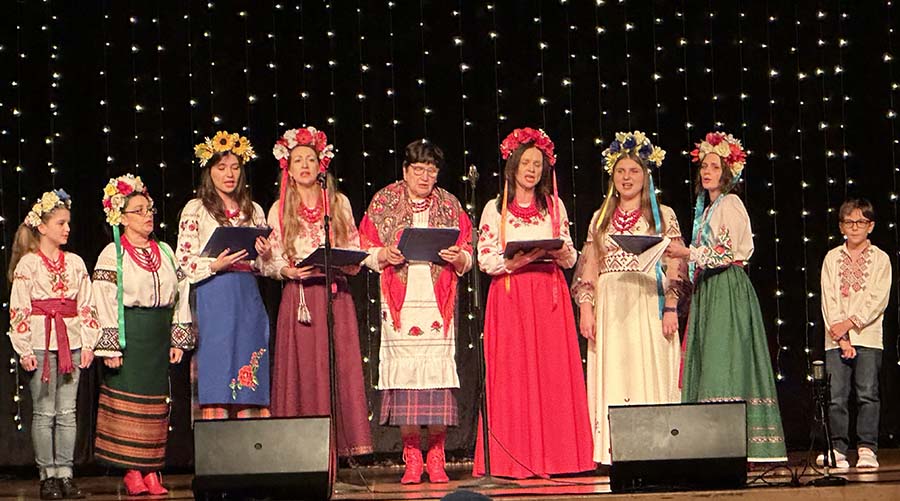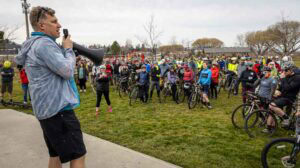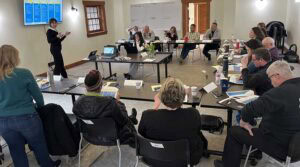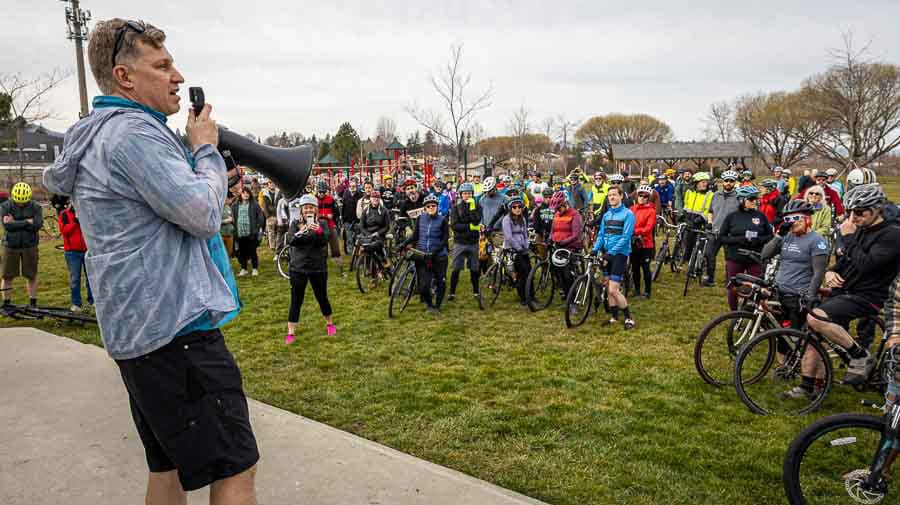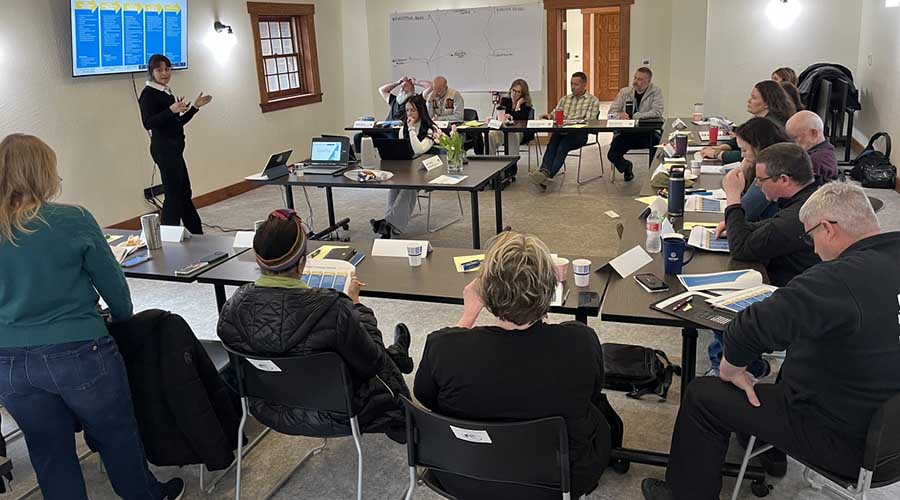Founder of women’s Ukrainian singing group Kalinonka recounts escaping the war and using song to ‘bear suffering’; group set to perform Dec. 14 at Ukraine benefit concert
By Sydney Seymour, Ashland.news
After fleeing the war in Ukraine, Lyudmila Sokol keeps her culture close with song as the founder of Kalinonka — a Ukrainian singing group made up of women who sought refuge in the Rogue Valley.
She described Kalinonka as “the light” and “salvation” that keeps the singers going amid pain and war in their home country.
“Each rehearsal feels like a warm gathering of friends, like a celebration that reminds ourselves who we are,” Sokol said in Ukrainian. Her daughter, Katya, translated for her during an interview at the Ashland.news office. “Every performance is like a shared prayer for Ukraine.”
Sokol, who also works for the Oregon Shakespeare Festival costume department, founded Kalinonka to share and remember Ukrainian beauty and tradition. From weddings to holidays to days at work, Ukrainians “sing always,” she said, “in joy and in sorrow.”
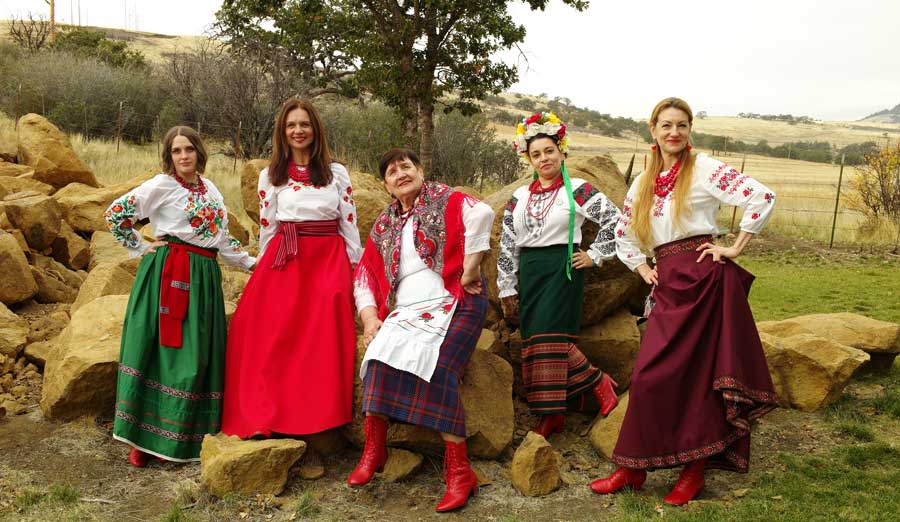
Escaping the war
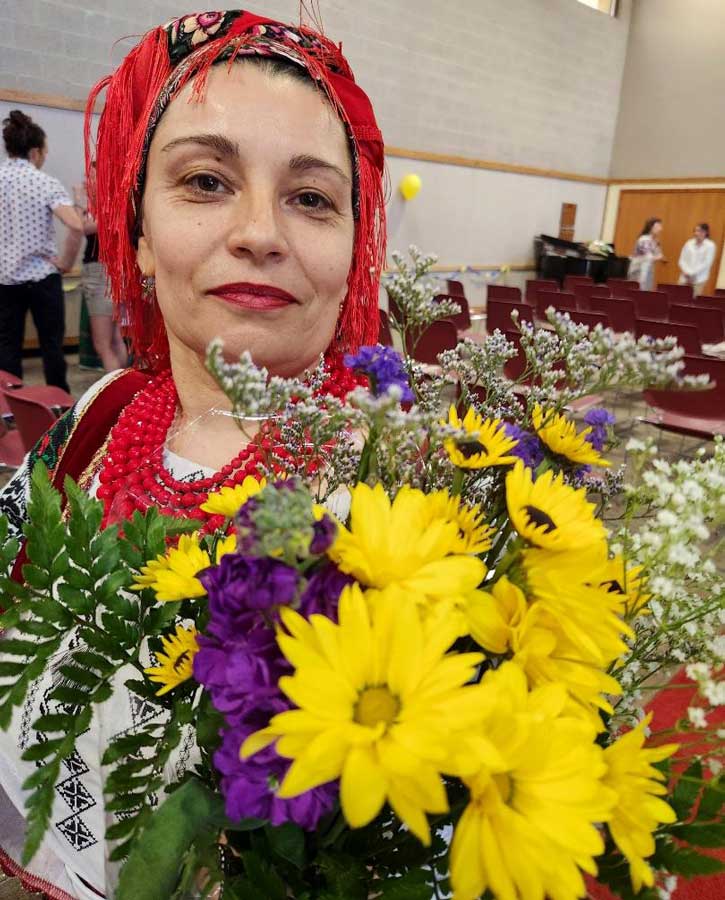
On Oct. 13, 2022, Sokol and her husband, two sons and daughter Katya escaped the war in Ukraine and found sanctuary in Ashland. The Sokol family is one of 27 families now taking refuge in Ashland — a figure published in an Aug. 24 city news release.
“Three and a half years have passed, but the pain is still alive within me,” Sokol wrote in a translated written statement to Ashland.news after the interview. “It is a wound that does not heal.”
The Sokol family is from the Odesa region of Ukraine — one of Ukraine’s most famous and culturally significant cities, according to The Telegraph. The Black Sea port city became a key target within the first week of the war. Russian drones, military and artillery continue to kill and injure civilians and devastate buildings.
Her eyes brimming with tears, Sokol said she remembers the day the war started “every second.” Her daughter continued to translate: “It was really the hardest.” Katya reached her arm out to comfort her mother.
Russia began their full-scale invasion in the early morning on Feb. 24, 2022. Sokol’s husband, like always, carried a cup of coffee to her while she was still in bed with her youngest son.
Her phone buzzed and pinged with hardly a moment in between.
Parents who went to the same school as her son messaged that their kids weren’t going to school that day. Sokol scrolled through the flood of incoming texts — one stopped her.
“A teacher texted that we just heard we’re getting bombed,” her daughter translated as Sokol’s voice trembled. “We didn’t understand what was happening, but we knew everyone was in danger.”
Before the war, the Sokol family were among many that thought Russia would protect Ukraine, which is what made this war “worse.” Katya continued in translation, “Nobody thought we would get attacked by that country. It was a shock.” For weeks, they hoped it wasn’t true.
They prayed almost every night that the war would stop. A month in, Sokol and her family were forced to hide — sometimes five to 12 times a day — during air-raid alerts when explosions were close to their home.
The family laid a mattress on the floor of their small walk-in closet to hide — only after Sokol realized how dangerous that was considering its large mirrors. At the beginning of the war, the “two-walls rule” said the safest place to hide was at least two windowless walls away from the street.
In hiding, her son, who was 6 or 7 at the time, said, “Mama, I want to leave.”
After what he said, Sokol’s daughter translated, “We decided to save his life and leave the country. The war removed us. It wasn’t our decision to leave Ukraine; it was better to leave for the future of our children.”
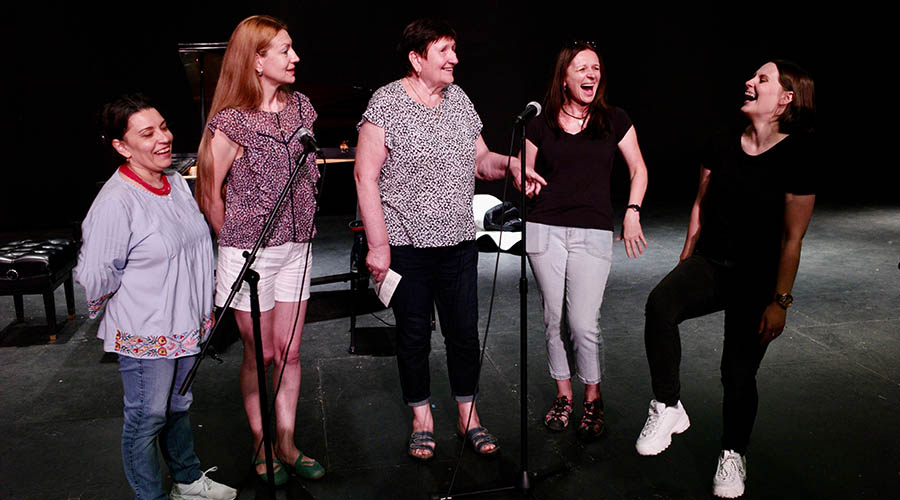
Journey to America
Months into the war, the family connected with the organization Uniting for Ukraine (U4U), which helps resettle refugees in the Rogue Valley.
When the Sokol family met their host Megan Danforth at the airport, Danforth offered them homemade chicken soup. “It was the tastiest, best soup ever,” Sokol said with a big smile and a laugh as her daughter translated.
“How is it possible that people I have never met, from another continent, welcome me as a dear guest, while those who share so much with us want to destroy my people?” Sokol wrote in a later statement to Ashland.news.
Sokol described living in Ashland as similar to Ukraine in terms of the weather and the people. “We have the same soul,” Katya translated. “People have a very big heart.” Sokol expressed her appreciation for all of the Americans supporting her family and nationality in “tough times, holding us like babies.”
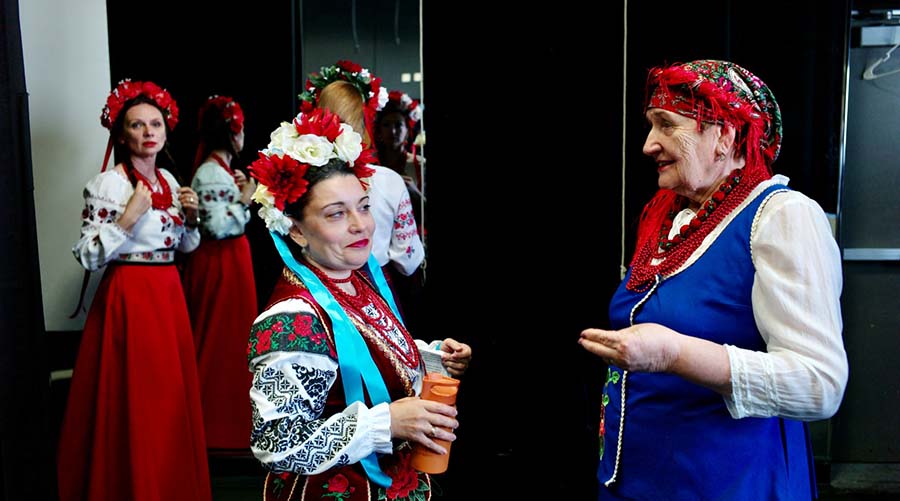
Forming Kalinonka
The Sokol family stayed in Danforth’s home for nine months. Missing Ukraine and inspired by Danforth, a singer herself, Sokol told Danforth that she wanted to create a Ukrainian singing group called “Kalinonka” in the summer of 2023.
The deets:
Ukrainian benefit concert, 2 to 4:30 p.m. Sunday, Dec. 14, Ashland High School Theatre, 201 S. Mountain Avenue. Tickets are available for $20 for adults or $15 for seniors and students over 12. Tickets are free for AHS students (with ID) and children under 11. For more information, call event coordinator Betsy Bishop at 541-840-6410.
The name derives from the “kalyna,” or red viburnum — a common plant and symbol of Ukraine that represents “feminine beauty, strength, love and the songful soul of our people,” Katya translated. Many Ukrainian songs, like “Oi u luzi chervona kalyna,” or “Oh, the Red Viburnum in the Meadow,” feature the plant.
Soon after the idea emerged, other women joined — women who, like Sokol, had come to the Rogue Valley through the U4U program, escaping the war.
There are five main members of the group: Sokol, Maria Shipovska, lead vocalist Valentyna Zaiets and her two daughters, Natalia Gutierrez and Olha Dubova. Sometimes, Sokol explained, other family members and friends join in rehearsals and concerts too.
At first, the group gathered together most evenings as Danforth led rehearsals. Drinking tea and singing inside Danforth’s house, Sokol said she felt “at home.”
“Song is our power, memory and soul. Song is the fire that unites, heals and gives the feeling of home, even far from home,” she continued in a later translated written statement. “Because with song, it’s easier to bear suffering and the longing for our homeland, the one we cannot return to while the war still goes on.”
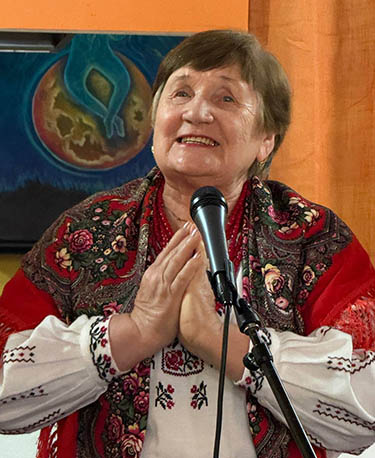
She pointed out that the group sings to bring “love and goodness into the world.” She continued, “It’s our way of saying to the world that we exist, we are beautiful and we are Ukraine.”
The group performs many different songs — most hundreds of years old. The songs are about “the harvest, the bread, the sky, the stars, and life itself,” Sokol’s daughter translated. “Each carries the voices of our ancestors, the wisdom of generations and the story of Ukraine.”
The world-famous “Carol of the Bells” actually comes from Ukraine — originally the folk song “Shchedryi vechir,” or “Bountiful Evening.”
Kalinonka continues to rehearse and has performed 18 times, each one dedicated to supporting Ukraine. Their next performance is at the Ashland-Sviathorsk Aid Project benefit concert to aid Sviatohirsk — Ashland’s “sister city” in Ukraine — from 2 to 4:30 p.m. Sunday, Dec. 14, at Ashland High School Theatre where they will sing traditional Ukrainian holiday songs (including the Ukrainian version of “Carol of the Bells”).
“And every time Kalinonka sings, I feel Ukraine is near,” Sokol sent a translated written statement to Ashland.news after the interview, “in our voices, in our hearts, and in every note of love.”
More than three and a half years into the Russia-Ukraine war and with 27 families now living in Ashland, this is part two of a series highlighting Ukrainian voices. If you would like to share your story with Ashland.news, email Ashland.news reporter Sydney Seymour at [email protected].
Nov. 24, 2025: A previous version of this story incorrectly reported that Maria Shipovska is Valentyna Zaiets’s daughter. Zaiets’s daughters are Olha Dubova and Natalia Guitierrez. The story has also been updated to reflect that Dubova goes by Olha, not Olga.
Dec. 1, 2025: Corrected Megan Danforth’s last name.
Related stories:
‘When we sing, we feel as if we are home again’: Upcoming holiday benefit concert for Ashland’s sister city in Ukraine (Nov. 25, 2025)
Ashland violinist continues to aid Ukrainians three years into war (Nov. 14, 2025)
Free workshop in Ashland invites public to make traditional Ukrainian dolls (Oct. 21, 2025)
Ukrainian magic at the Shakespeare Festival (June 9, 2025)
‘This war, unfortunately, goes on’: Ashland Sister City project seeks support at fundraiser (April 1, 2025)
Viewpoint: Helping Ukrainians in need (March 22, 2025)
Viewpoint: Two separate Rogue Valley organizations support Ukrainians (March 7, 2025)
Ukrainian refugee in Ashland: ‘Without the help of the United States, Ukraine will not survive’ (March 5, 2025)
Ashland photographer Christopher Briscoe to share stories and images of war-ravaged Ukraine (March 4, 2025)
Sister City group makes assurances donations going through secure channels to Ukraine (March 4, 2025)
Hundreds hear tips on how to respond to changing immigration policy (Feb. 26, 2025)
Review: ‘Unbreakable Spirit’ tells of Ukraine’s anguish with soaring music (Nov. 1, 2024)
Ukraine: A cultural celebration (Oct. 20, 2024)
Concert series at SOU to showcase musicians from embattled nations (Aug. 31, 2024)
Two years in, no end in sight: An Ashland resident’s report from Ukraine (Feb. 23, 2024)
Concert fundraiser puts Ashland’s Ukrainian Sister City center stage (Dec. 11, 2023)
Fundraiser for Sviatohirsk, Ukraine, Ashland’s Sister City (Nov. 29, 2023)
Ashland to Sviatohirsk: ‘Ashland is with you. Together we will overcome’ (Aug. 20, 2023)
Telling Ashland’s Ukrainian sister city’s story — and doing something about it (Aug. 13, 2023)
Ties between Ashland and Ukraine grow closer with new sister-city relationship (June 21, 2023)
Ukrainian refugee family finds a home in Ashland (Oct. 12, 2022)

